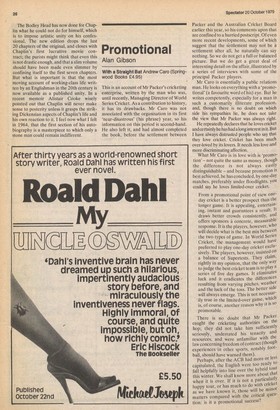Promotional
Alan Gibson
With a Straight Bat Andrew Caro (Springwood Books £4.95) This is an account of Mr Packer's cricketing enterprise, written by the man who was, until recently, Managing Director of World Series Cricket. As a contribution to history, it has its drawbacks. Mr Caro was not associated with the organisation in its first 'near-disastrous' (his phrase) year, so his information on this period is second-hand. He also left it, and had almost completed the book, before the settlement between Packer and the Australian Cricket Board earlier this year, so his comments upon that are confined to a hurried postscript. Of even more recent developments, some of which suggest that the settlement may not be a settlement after all, he naturally can say nothing. So we do not get a full or balanced picture. But we do get a great deal of interesting detail on the affair, illustrated by a series of interviews with some of the principal Packer players.
Mr Caro is essentially a public relations man. He looks on everything with a 'promotional' (a favourite word of his) eye. But he writes competently, especially for a man in such a customarily illiterate profession, and, though there is no doubt on which side his sympathies lie, he does not take the view that Mr Packer was always right. He repeatedly declares that he loves cricket and certainly he has had a longinterest in it. But I have always distrusted people who say that they love cricket. Cricket has been much over-loved by its lovers. It needs less love and more discriminating affection.
What Mr Caro is in love with is 'promotion' — not quite the same as money, though the difference is not always easily distinguishable — and because promotion is best achieved, he has concluded, by one-day matches, preferably under floodlights, you could say he loves limited-over cricket.
From a promotional point of view oneday cricket is a better prospect than the longer game. It is appealing, entertaining, instant and guarantees a result. It draws better crowds consistently, and offers sponsors a concrete, measurable response. It is the players, however, who will decide what is the best mix between the two types of game. In World Series Cricket, the management would have preferred to play one-day cricket exclusively. The players, however, insisted .on a balance of Supertests. They claim, rightly in my opinion, that the only way to judge the best cricket team is to play a series of five day games. It eliminates luck and it eradicates the differences resulting from varying pitches, weather and the luck of the toss. The better side will always emerge. This is not necessarily true in the limited-over game, which is, of course, another reason why it is so promotable.
There is no doubt that Mr Packer caught the cricketing authorities on the hop; they did not take him sufficiently seriously, underrated his tenacity and resources, and were unfamiliar with the law concerning freedom of contract (though experiences in other sports, notably football, should have warned them). Perhaps, after the ACB had more or less capitulated, the English were too ready to fall helpfully into line over the hybrid tour this winter. We shall know more about that when it is over. If it is not a particularly happy tour, or has much to do with cricket as we have known it, those will be minor matters compared with the critical question: is it a promotional success?






































 Previous page
Previous page